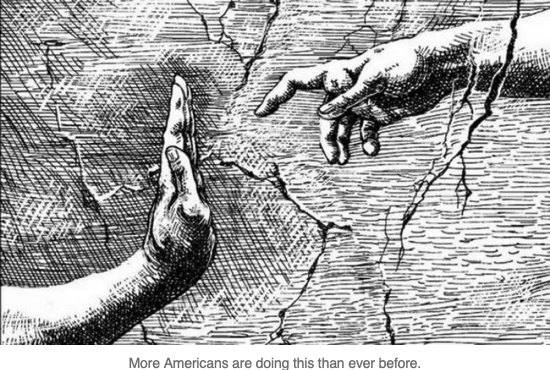"The big new development this year is the rise of 'Cultural Christianity' or the 'Culture War Christian'—the intellectual who doesn’t necessarily believe in God, but who thinks that Christianity is still somehow necessary for the cultural defense of Western Civilization...."Early this year, I linked to a good article in 'Persuasion' by Matt Johnson describing how these Culture War Christians are bringing religious dogma back to the 'heterodox community.' Then Cathy Young leapfrogged us all with the magnificent phrase, “the paradox of heterodox orthodoxy.” Basically, this is what happens when 'anti-woke' intellectuals rebel against the dogmas of the far left—but don’t have the independence of mind to come up with an alternative worldview based on their own observation.
"I added to Johnson’s critique of this phenomenon."'Johnson focuses too much on grounding Western liberalism in 'Enlightenment rationalism and skepticism.' That’s true (depending on the meaning of 'skepticism'), but there’s a deeper and more convincing answer."I can’t emphasise this enough. 'Western Civilisation' cannot be based on Christianity, because it predates the birth of Christ by at least five centuries. I have an article coming out soon that is very specifically about the pre-Judeao-Christian origins of our civilisation, though it probably won’t be published until January.
"'Conservatives try to ground Western Civilisation on the 'Judeo-Christian tradition'—you know, the one that crashed Western Civilisation the first time it became widely accepted. But they write out of history the true source of unique Western culture: the Greco-Roman tradition. The distinctive culture of the West was created—and even the idea of “'he West' as culturally distinct from 'the East,' originated by Herodotus in response to Persian invasions—by Greek scientists and philosophers centuries before the birth of Christ, and at about the same time the books of the Old Testament were first being written down.
"But I’ve spent much of this year attempting to convince people of the viable cultural and intellectual alternatives to Christianity—alternatives that are not merely theoretical, but already here."~ Robert Tracinski from his post 'Is There Something in the Nothing?'
Thursday, 19 December 2024
“The Paradox of Heterodox Orthodoxy”
Subscribe to:
Post Comments (Atom)

4 comments:
This part in particular helped me nail a lot of what seems to be happening on the political right in most parts of the world:
"Basically, this is what happens when 'anti-woke' intellectuals rebel against the dogmas of the far left—but don’t have the independence of mind to come up with an alternative worldview based on their own observation."
Exactly. So much of the political right is simply reaction (or sometimes even adoption) to far-left positions. As in the promotion of identity politics, but reversed to value "whiteness."
It's not only obscene, it allows the far left to set the political right's agenda...
I think that Toynbee had this more nearly right than any other historian. There is not one "Western Civilisation" and a different "Eastern". There are a couple of dozen civilisations of which we know. A few are extant (the "Western", the not-quite-extinct remnants of two Islamic ones, a Far Eastern, an Indian, and a Russian Orthodox one). We have evidence of several more which no longer exist: three in the Americas, one in Egypt, several in the Middle East and, very importantly, the Hellenic civilisation of classical Greece and Rome.
These civilisations differed in their political organisation, their ethical systems, their religions, and their art; much less so in their technology, which spreads easily from one society to another. Herodotus correctly recognised both that the Persians were civilised and that their civilisation was very different from that of the Greeks. But we now know that these are two examples of many, and "East" and "West" are not helpful labels.
Christianity got its start in the last centuries of the Hellenic civilisation, but the Hellenic civilisation was not Christian in either its belief systems or its political organisation. By 500 AD it had pretty much dissolved and Europe had sunk back into several centuries of barbarism. The civilisation that rose towards the end of the first millennium was quite different in its belief systems, its political organisation, and its art: the cathedrals of 11th-century Europe owe nothing to Hellenic architecture.
Toynbee explored examples of contacts between civilisations over time, of which the contact between the Hellenic and our own is a well-known example. The rediscovery of Greek philosophy and Roman law took place across the barbarian gap between the disintegration of the one and the rise of the other, and are not evidence that the gap never existed. As Tracinski says, the Hellenic civilisation was not based on Christianity, for the obvious reason that it predated it. But the modern Western civilisation quite clearly *is* based upon Christianity, although it is rapidly abandoning it.
You make a very good point Paul. Western civilisation as we know it from say the Enlightenment onwards draws from both Greco-Roman civilisation and Christianity, for better or for worse.
Post a Comment